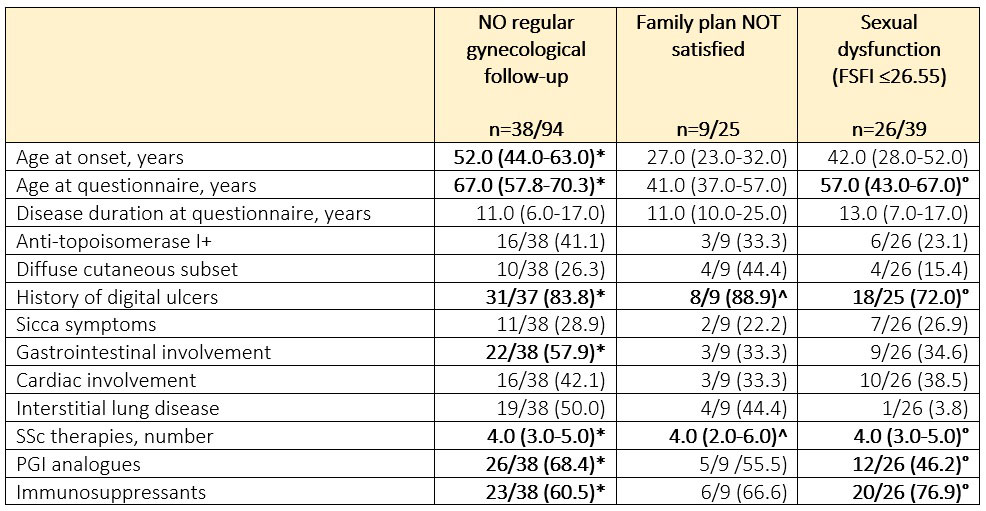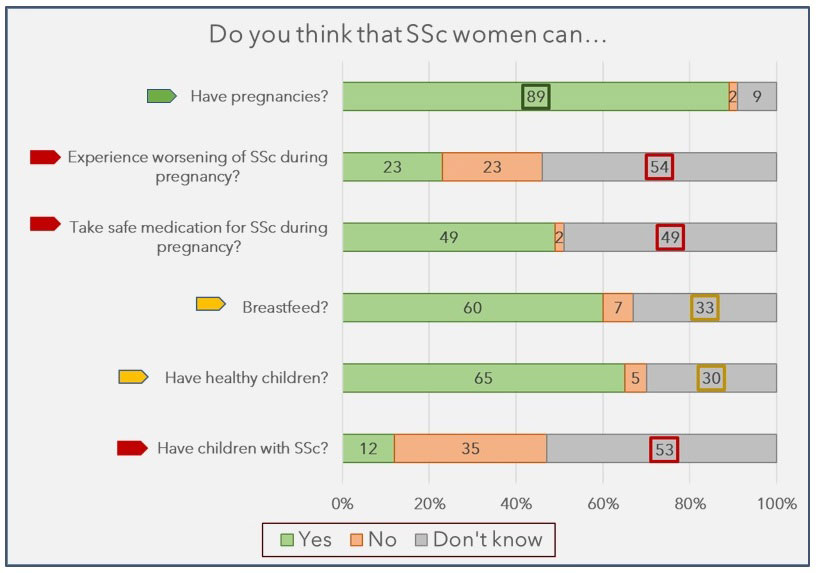Session Information
Session Type: Abstract Session
Session Time: 10:30AM-11:30AM
Background/Purpose: Systemic Sclerosis (SSc) has a strong female predominance and can significantly impair the everyday quality of life of patients. We aimed at designing a SSc-specific, patient-reported questionnaire to explore the aspects of women’s health most affected by the disease and additionally evaluate their association with clinical features.
Methods: The questionnaire was created together with Obstetricians-Gynecologists (70 questions, 5 sections) and administered to consecutive patients with SSc (2013 ACR/EULAR classification criteria) regularly attending our Clinic during 2021. The Female Sexual Function Index (FSFI) questionnaire was also administered. Data regarding clinical and laboratory features were obtained from clinical charts.
Results: The questionnaires were proposed to 114 patients; among 100 who accepted to participate (median age: 59 [43-67] years, median disease duration: 11 [6-17] years; limited cutaneous subset in 75%; anti-centromere positivity in 44%), 48 had received SSc diagnosis during reproductive age (< 45 years).
A regular gynecological follow-up was not declared by 40% of the women. These patients, as compared to those regularly attending gynecological controls, were older at diagnosis and at questionnaire (Tab 1), had lower school education (p:0.02) and were more frequently post-menopausal (p:0.01). Clinically, they presented a more severe SSc phenotype requiring more systemic therapies (Tab 1).
Regarding sexuality, 59% reported that it was negatively affected by SSc, especially by vaginal dryness (67%), digital ulcers (37%), gastro-intestinal involvement (37%) and dyspnea (20%). Among 39 patients who completed FSFI, 67% had sexual dysfunction (Tab 1).
Considering 48 patients with SSc-diagnosis during reproductive age: 73% never discussed contraceptive methods with their SSc-Clinicians; 54% desired a pregnancy after diagnosis, but 30% did not satisfy their family plan (Tab 1). In addition, half of them reported they did not know whether a SSc woman could experience disease worsening or take safe medications during pregnancy, and have children also affected by SSc (Fig 1).
After SSc onset, 22 women declared 43 pregnancies with 33 live births. A higher frequency of cesarean sections (p:0.01) and a lower weight at birth of the babies (p:0.01), as compared to 146 pregnancies (121 live births) occurred before SSc onset, were reported. An improvement or stability of SSc-manifestations during pregnancy was reported by 77% of the patients.
Conclusion: The newly created specific questionnaire was instrumental to facilitate physician-patient communication about ‘women’s health’ and highlighted the aspects most affected by SSc and the unmet needs of the patients. The analysis of the clinical features confirmed that a greater disease severity can have a major impact on the quality of life of these women.
GILS (Gruppo Italiano Lotta Sclerodermia) is kindly acknowledged for supporting the study with a grant.
Continuous variables are reported as median (IQR) and compared with Mann-Whitney test; categorical variables are reported as number/number of available data (%) and compared with Chi Squared/Exact Fisher test. *p<0.05, comparison with patients who had regular gynecological follow-up; ^p<0.05, comparison with patients who satisfied the desired family size after SSc diagnosis; °p<0.05, comparison with patients with FSFI >26.55.
To cite this abstract in AMA style:
Lazzaroni M, Moschetti L, Pedretti E, Lojacono A, Ramazzotto F, Zanardini C, Sonia Z, Tincani A, Franceschini F, Airò P, Andreoli L. The Impact of Systemic Sclerosis (SSc) on Women’s Health Evaluated with a New SSc-specific Patient-reported Questionnaire [abstract]. Arthritis Rheumatol. 2022; 74 (suppl 9). https://acrabstracts.org/abstract/the-impact-of-systemic-sclerosis-ssc-on-womens-health-evaluated-with-a-new-ssc-specific-patient-reported-questionnaire/. Accessed .« Back to ACR Convergence 2022
ACR Meeting Abstracts - https://acrabstracts.org/abstract/the-impact-of-systemic-sclerosis-ssc-on-womens-health-evaluated-with-a-new-ssc-specific-patient-reported-questionnaire/


